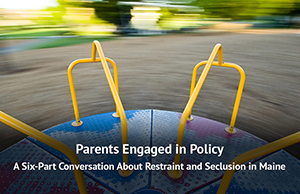Parents Engaged in Policy: A Six-Part Conversation About Restraint and Seclusion in Maine (ME UCEDD and NH-ME LEND)
June 11, 2018

|
| Parents Engaged in Policy video thumbnail |
Two Maine parents of children with disabilities have produced a series of six videos to help educate parents about appropriate and incorrect uses of restraint and seclusion in educational settings in Maine.
Jodie Hall, a 2017-2018 family trainee in the New Hampshire-Maine Leadership Education in Neurodevelopmental and Related Disabilities (NH-ME LEND) Program, recently completed a 70-hour community leadership placement with the Maine Coalition Against Restraint and Seclusion (C.A.R.S.). Ms. Hall worked closely with Deb Davis, a Coalition member who is also a non-attorney special education advocate. Both Hall and Davis are parents of children with disabilities who experienced incidents of restraint in school settings. In 2011, Ms. Davis was invited by the Maine Commissioner of Education to serve on the Consensus Based Rulemaking Team that was revising the rule governing physical restraint and seclusion in the state.
Hall and Davis' collaboration led to the development of the educational video series: Parents Engaged in Policy: A Six-Part Conversation About Restraint and Seclusion in Maine. Each brief closed captioned conversation is topic-driven: Incident Reports, Functional Behavioral Assessment, Time-out or Seclusion?, Emergencies (not Prevention); Using Data as a Tool, and The Written Word Matters. Dr. Alan Kurtz served as faculty mentor on the project.
Hall and Davis identified the following goals for the video series:
- Educate parents about appropriate and incorrect uses of restraint and seclusion;
- Teach parents to work collaboratively with schools to ensure their child's behavior is being appropriately understood;
- Highlight the importance of exploring the function or meaning of behavior in order to respond in less restrictive alternatives;
- Provide resources which teach preventative strategies and alternative approaches and support a reduction in the use of restraint and seclusion; and
- Once an incident of restraint or seclusion has occurred, provide families with information to engage effectively in the debriefing process with the school and make the necessary adjustments to prevent restraint and seclusion from occurring again.
Parents Engaged in Policy: A Six-Part Conversation About Restraint and Seclusion in Maine, was supported by the New Hampshire-Maine Leadership Education in Neurodevelopmental and Related Disabilities (NH-ME LEND) Program with funding from the Maternal and Child Health Bureau, Health Resources and Services Administration (HRSA); and by the University of Maine Center for Community Inclusion and Disability Studies, Maine's University Center for Excellence in Developmental Disabilities, with funding from the U.S. Department of Health and Human Services, Administration for Community Living.
Viewpoints expressed in the videos are those of the participants and do not reflect official Maternal and Child Health Bureau or Administration for Community Living policy.







